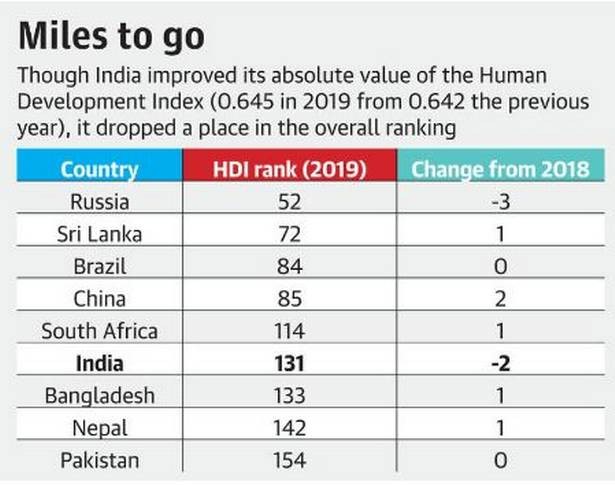PREVIOUS
Human Development Report 2020
December 19 , 2020
1821 days
8507
0
- The United Nations Development Programme recently released this report.
- In 2020, the theme is Human Development and Anthropocene.
- It provides HDI ranks for 2019.
- This year report presents an adjustment to the index for "planetary pressures".
- It means adjusting the standard HDI by a country’s level of carbon dioxide emissions and material footprint, each on a per capita basis.
- India slipped to 131st rank among 189 countries.
- Norway, Ireland and Switzerland occupied the top 3 ranks in the report.
- Hong Kong is placed fourth while Iceland and Germany secured the fifth and the sixth rank on the global ranking.
- The report ranks China at the 85 position and Pakistan at 154.
India’s performance
- Human development index of India was 0.640.
- Life expectancy of Indians at birth in 2019 was 69.7 years.
- India's gross national income per capita fell to USD 6,681 in 2019 from USD 6,829 in 2018 on purchasing power parity (PPP) basis.
- In 2019, India ranked fifth for installed solar capacity.
- India's HDI value for 2019 is 0.645.
- In 2018 India ranked at 130.
- It is in the medium human development category.
- Between 1990 and 2019, India’s HDI value increased from 0.429 to 0.645, an increase of 50.3 percent.
- Between 1990 and 2019, India’s life expectancy at birth increased by 11.8 years, mean years of schooling increased by 3.5 years, and expected years of schooling increased by 4.5 years.
- India’s GNI per capita increased by about 273.9 percent between 1990 and 2019.
- Solar capacity in India increased from 2.6 gigawatts in March 2014 to 30 gigawatts in July 2019.
About HDI
- It was first launched in 1990 by the Indian Nobel Laureate Amartya Sen and Pakistani economist Mahboob Ul Haq.
- It is measured average achievement across three dimensions of human Development.
- It is including life expectancy, education and per capita income.

Leave a Reply
Your Comment is awaiting moderation.


